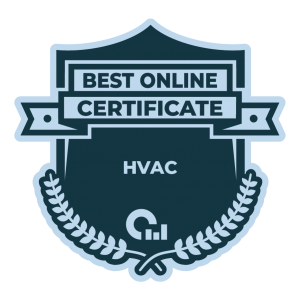If you are mechanically minded, interested in how things work, and are skilled in hands-on tasks, consider getting an online HVAC certificate.

Today’s modern buildings all need heating and cooling systems that require installation, maintenance, repair, and sometimes replacement. If you’re looking to expand your technical skills or move into the HVAC career path, the universities listed below can offer you top-notch training and certification in HVAC repair, installation, maintenance, and replacement for both commercial and residential buildings.
Review these details to see if an online HVAC certificate could provide the instruction you need to expand your construction or technical career.
What Is an Online HVAC Certificate?
The demand for skilled professionals that can provide repair, maintenance, replacement, and installation of heating and air conditioning equipment is constant in both residential and commercial buildings. An HVAC certificate offers students that are mechanically inclined and enjoy working with hands-on projects the opportunity to learn how to install, repair, or replace heating and air conditioning systems. Certificate programs ensure that students learn all of the skills needed to pass their state certification testing and succeed on the job.
How Much Can You Earn with an Online HVAC Certificate?
An HVAC certificate offers workers a variety of job opportunities in the plumbing, heating, and air conditioning industries. Technicians and refrigeration providers can work in the private, public, or government sectors as well as in self-employed opportunities. The largest employers of HVAC certificate holders are the industries of heating, air conditioning, and refrigeration mechanics and installers.
In 2019, the U.S. The Bureau of Labor and Statistics reported that HVAC mechanics and installers made median earnings of about $48,730, but workers in the educational field for state, local, or private institutions made about $52,430 annually. Contractors in the HVAC market made about $47,380 annually while workers in the retail HVAC services trade earned about $48,620 annually. Some states may require additional licensing or training to work in the HVAC industry so check your local licensing board for details.
What Is Required For an Online HVAC?
Obtaining an online HVAC certificate traditionally requires a GED, high school diploma, or similar equivalent. Students will learn the tools of HVAC installation, troubleshooting and maintenance, safety procedures, and the theories and principles of heating and cooling. Expect to focus on the most commonly used refrigerating systems, the components of most HVAC systems, and the proper procedures for maintenance and repair service. Some programs will offer students the ability to complete the EPA 608 Certification Exam that provides professional credentials in the environmental standards required by the Environmental Protection Agency (EPA).
What Are the Best Online HVAC Certificates?
OSR uses six data points: three school-wide and three program-specific. For school-wide, OSR uses Student Satisfaction, Admission Rates, and the number of programs the school offers online. For program-specific, OSR checks the Median Debt of graduates from that program, how many degrees are offered within that program’s umbrella department, and what percentage of students at that school graduated from that department.
The six statistics are displayed by each school. The sliding bar under each statistic represents how that school compares to other US institutions. “Not reported” means a school did not release that information to the US Department of Education. A more detailed description of the OSR process can be found on the methodology page.










